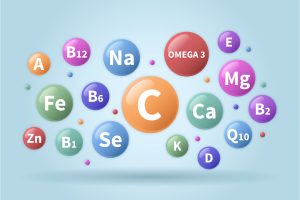What You Need To Know About Magnesium Deficiency – 7 Telltale Signs That You Are Magnesium Deficient
How To Know If You Have a Magnesium Deficiency
Overview

Estimates suggest that nearly half of Americans are not getting enough of this crucial nutrient that plays a direct role in over 80% of the body’s metabolic processes. In fact, magnesium deficiency is extremely common all over the world—especially in the older population and those with type-2 diabetes. Although it is usually not a serious condition, it can cause a variety of physical, mental, emotional, and psychotic symptoms that can affect your daily life and productivity.
Read on to find out more about magnesium deficiency, what causes it, and how to know if you are missing the mark on this important micronutrient.
The two types of magnesium deficiency
More than 99% of the body’s magnesium is stored in bones and soft tissues. Less than 1% is in the form of electrolytes in the blood, the balance of which is maintained by a process called osmoregulation. A deficiency of this mineral (medically known as hypomagnesemia) can occur in two forms: acute and chronic.
Acute magnesium deficiency refers to an electrolyte imbalance caused by abnormally low levels of magnesium in your blood. It can cause a range of mild to severe health problems, including tremors, severe muscle cramps, numbness in limbs, acute weakness, abnormal eye movement, headache, arrhythmia, and seizures. It can happen when there is a sudden loss of fluids due to diarrhea, vomiting, sweating, or excessive urination. Starvation or critical illness can also make a person susceptible to magnesium deficiency or loss.
Low blood magnesium and electrolyte disturbance can occur suddenly and usually lasts for a short period of time. It can easily be diagnosed through a blood test.
Chronic magnesium deficiency, on the other hand, develops over time and is much more difficult to detect. It refers to a condition when you have low magnesium in your bones and cells, even though your blood magnesium levels are normal.
Chronic magnesium deficiency can cause a wide range of nonspecific symptoms that are difficult to pin down but can significantly affect your day-to-day life. This includes a general feeling of illness, low energy levels, low mood, frequent headaches, irritability, loss of appetite, and recurring muscle cramps. Living with magnesium deficiency has been associated with an increased risk and prevalence of various chronic diseases, including osteoporosis, type-2 diabetes, coronary artery disease, migraine, depression, dementia, and anxiety disorders.
7 telltale signs and symptoms of magnesium deficiency
While both types of magnesium deficiency are interrelated, they can occur independently. You can have acute hypomagnesemia without total body deficit, and your cells and bones may have low magnesium even though the blood test is normal. This is why a blood test is not considered accurate for diagnosing this condition.
However, there are some indirect signs and symptoms that may indicate you are magnesium deficient.
1. Your energy levels are depleted
If you feel fatigued most of the time (without any apparent reason) or find yourself easily exhausted, it is a clear sign that your body is trying to tell you something. While your energy levels depend on many factors, magnesium deficiency may be one of the reasons.
Symptoms of physical and mental fatigue are, in fact, one of the earliest signs of low magnesium in cells. This is because our cells require this mineral to produce ATP—the primary energy currency of cells that supplies energy for everything we do, from respiration and digestion to muscle contraction and everyday activities.
2. You are losing muscle strength and flexibility
Your muscle health and physical performance are heavily dependent on normal magnesium levels because it is required for muscle protein synthesis and food-to-energy conversion. If your daily diet falls short of this nutrient, your muscles may not receive sufficient energy for growth in the first place—regardless of how protein-rich and nutritious your meals are.
Studies have linked low magnesium in cells with reduced muscle performance and loss of muscle mass. On the other hand, optimal magnesium consumption has been found to increase exercise endurance, grip strength, bone mineral density, and muscle flexibility. Chronic magnesium deficiency is also known to increase the risk of injuries, fractures, and sarcopenia.
3. Muscle cramps and aches are more common than they used to be
Magnesium helps regulate muscle contractions and induces relaxation in overworked muscles. Low magnesium levels in your cells can make this function less effective, which may increase the frequency of cramps and aches induced by physical activity.
Moreover, a lack of magnesium in the body is often associated with low calcium and potassium levels—both of which play a key role in pain management. Research shows that getting your daily recommended dose of magnesium can help relieve period cramps, exercise-induced aches, and fibromyalgia symptoms.
4. It is harder to focus and think clearly
Magnesium plays a key role in the coordination and communication of nerve cells. It also helps produce ATP for carrying out various brain functions. Not getting enough of this mineral can negatively affect brain health and trigger symptoms of mental fog. Studies have shown that magnesium deficiency in cells can cause slow information processing, lack of motivation, poor concentration, and memory impairment in healthy individuals.
5. You feel irritable or heavyhearted most of the time
If you frequently feel out of spirits or find yourself snapping at others only to regret it later, magnesium deficiency may be a possible culprit. Optimal magnesium concentration (both in cells and blood) is critical for the smooth functioning of the central nervous system, which is the control center of the brain that regulates stress response, mood, emotions, sleep, hormonal functions, digestion, and energy levels.
An ongoing deficiency may have a wide-ranging impact on your mood and behavior. It has been shown to cause a lack of emotion, agitation, confusion, restlessness, anxiety, and mood swings. Studies have also linked magnesium deficiency with an increased risk of depression.
6. Your sleep is troubled, and it’s harder to doze off
Abnormal magnesium levels in your system—either too low or too high—can cause sleep problems like insomnia and poor sleep quality. Magnesium helps activate the parasympathetic nervous system, which reduces stress levels, lowers heart rate, and induces relaxation of the body and mind.
Magnesium also helps in the regulation of neurotransmitters that are directly involved in sleep promotion. Research shows that it can bind with GABA receptors that slow down mental activity and prepare you for peaceful sleep.
7. Stress headaches and migraine attacks are more frequent
Numerous studies have shown a direct relationship between magnesium deficiency and an increased frequency of headaches. Among people living with migraine, those who face frequent attacks have lower levels of magnesium in their cells than those who have controlled symptoms. Experts think that this may be due to magnesium’s role in blocking pain signals and inflammation. Low dietary intake of magnesium can also result in poor stress control and hormonal disturbances, which can trigger migraine attacks and tension-type headaches.
What causes magnesium deficiency?
Poor diet: It can happen when your diet lacks magnesium-rich foods and mostly contains refined and processed carbs. Research shows that refining or processing can reduce magnesium concentration in foods by 85%. Cooking or boiling magnesium-rich vegetables also causes significant loss of this mineral.
Poor absorption: Certain digestive disorders can cause loss of proteins and enzymes needed for magnesium absorption. Living with celiac disease for a long time can damage intestinal villi—small hair-like projections found along the inner lining of intestinal walls that absorb nutrients from digested foods. This condition reduces the absorption of crucial minerals like magnesium, iron, zinc, and folate.
Excess elimination: People with poorly managed diabetes may lose excess magnesium due to frequent urination, which can put them at a higher risk of hypomagnesemia. Diuretics are also known to cause a deficiency in magnesium and potassium.
Chronic stress: Stress and sleep deprivation can cause magnesium stored in cells to move out into the blood. Certain conditions like pancreatitis can also cause magnesium in blood to move into cells.
How to treat a magnesium deficiency
Magnesium deficiency can be remedied, and you should consult your medical professional to check your magnesium levels, first and foremost. Diagnosis of magnesium deficiency varies from one country to another and from person to person, but your doctor can help you determine the best course of action for you. When magnesium levels are low, the body reduces the amount excreted by the kidney while absorbing extra magnesium from the small intestine. The following are some actions you can take:
Eat the right foods: It is possible to improve your magnesium level and reach a high level of magnesium by consuming the right foods such as green vegetables, fruits, whole grains, and legumes (be sure to sprout – soak the legumes for 6 to 12 hours before cooking and cook in a pressure cooker – to limit the lectin exposure). From highest to lowest magnesium content, the following foods are great to help reverse magnesium deficiency:
- Pumpkin Seeds
- Chia Seeds
- Nuts (Almonds and Cashews)
- Spinach
- Black Beans
- Edamame
- Avocado
- Fish (Wild caught Salmon and Halibut)
- Beef (Grassfed/grass-finished beef only)
- Broccoli and Carrot

Of these, Magnesium L-Threonate is the only one from the formulations above from my research that can cross the blood-brain barrier, and Magnesium Chloride Hexahydrate is the most bioavailable magnesium and also fast absorbing. I personally supplement with these two magnesium formulations regularly.
>>>Read my review of Activation Products Ease Magnesium Chloride<<<
Remember, the absorption of magnesium varies from person to person, and exceeding the recommended dosage can cause diarrhea, cramping, and nausea. A word of caution for those with reduced kidney function, infants, and some older adults is that exceeding the recommended dosage of magnesium can increase the risk of magnesium toxicity.
Final thoughts
Magnesium deficiency can cause various symptoms affecting muscle functions and the nervous system. Many factors can contribute to low magnesium in the body. It can happen when you are not getting enough magnesium from your diet, if the body is not able to absorb magnesium, or if you are flushing out more magnesium than usual. If you suspect you have a magnesium deficiency, try increasing your dietary intake by including lots of fiber-rich foods, nuts and seeds, and green leafy vegetables in your diet.
However, dietary changes alone may not be sufficient for correcting a mineral deficiency because its levels in the body fluctuate throughout the day as you eat and drink. To keep this vital mineral in balance, you may need to seek help from magnesium supplements. Some lifestyle adjustments like limiting your alcohol consumption, reducing the intake of processed foods, drinking plenty of water, and investing in self-care practices may also help.
Remember, “Do Something Everyday That Heal Your Body!”
To Your Health!
References
https://www.ncbi.nlm.nih.gov/pmc/articles/PMC1855626/
https://academic.oup.com/qjmed/article/111/11/759/4209351
https://ods.od.nih.gov/factsheets/Magnesium-HealthProfessional/
https://pubmed.ncbi.nlm.nih.gov/27910808/
https://www.ncbi.nlm.nih.gov/pmc/articles/PMC2146789/pdf/canfamphys00077-0094.pdf
https://www.nps.org.au/news/magnesium-a-treatment-for-leg-cramps#:
https://www.ncbi.nlm.nih.gov/pmc/articles/PMC8020016/
https://pubmed.ncbi.nlm.nih.gov/16542786/
https://pubmed.ncbi.nlm.nih.gov/2722406/
https://www.ncbi.nlm.nih.gov/pmc/articles/PMC6570791/
https://www.ncbi.nlm.nih.gov/pmc/articles/PMC7551876/#
https://www.ncbi.nlm.nih.gov/books/NBK507271/


























1 Comment
[…] magnesium is often overlooked in favor of other vitamins and minerals, it plays a significant role in […]